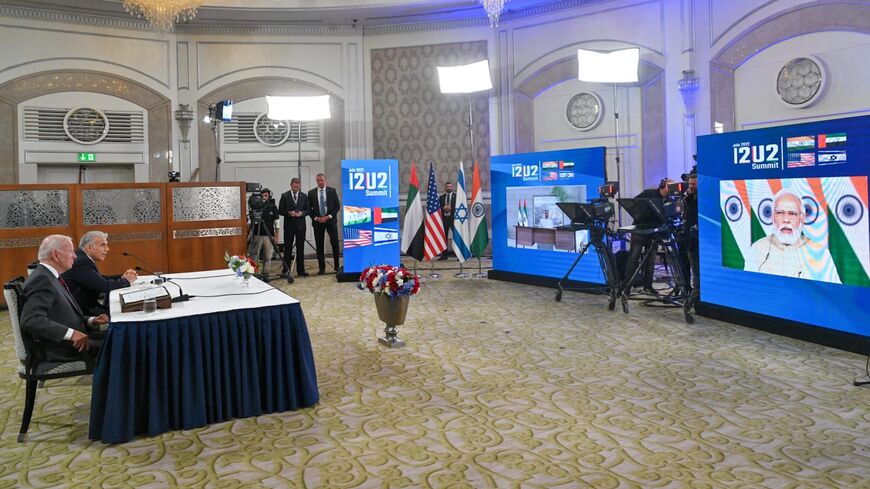The leaders of Israel, India, the United States and the United Arab Emirates held their first four-part summit on Zoom today, in the framework of the I2U2 forum established by Prime Minister Yair Lapid last October as foreign minister. The four leaders agreed to work together, harnessing their countries’ capabilities and ingenuity to address global challenges such as food security, fighting climate change and clean energy.
A statement issued before the Zoom meeting read, “This unique grouping of countries aims to harness the vibrancy of our societies and entrepreneurial spirit to tackle some of the greatest challenges confronting our world, with a particular focus on joint investments and new initiatives in water, energy, transportation, space, health, and food security.”
The statement went on, “We intend to mobilize private sector capital and expertise to modernize infrastructure, advance low carbon development pathways for our industries, improve public health and access to vaccines, advance physical connectivity between countries in the Middle East region, jointly create new solutions for waste treatment, explore joint financing opportunities, connect our startups to I2U2 investments, and promote the development of critical emerging and green technologies, all while ensuring near- and long-term food and energy security.”
Addressing his three counterparts, Lapid said that the I2U2 forum is “interesting because we are four very different countries, but when we started talking, it became clear we all want the same things: for our children to be warm in the winter, for them to have food on the table and clean water from the tap, for them to enjoy a quality education and advanced health care and transportation infrastructure.”
Lapid added, “We want to change the world for the better, but we are also creating relative advantages for our countries, for our businesses, for our science sector. We also want to reduce the damage our generation inflicted on the climate and the environment. These are big challenges. No single country, no matter how big or how rich, can deal with them alone.”
Israel has strong ties with India, both diplomatically and in security. Former Prime Minister Benjamin Netanyahu nurtured warm relations with Indian Prime Minister Narendra Modi and his successor Naftali Bennett continued those efforts. Israel is India’s biggest trade partner for security equipment and economic ties in other fields are also increasing rapidly.
In their opening remarks, the four leaders addressed different bilateral and multilateral projects in the domains of food security and clean energy, pledging to identify and support many more innovative projects in these sectors in the coming years.
One of the decisions made during the Zoom summit was to create a food corridor between India and the Emirates to fight food insecurity in India on the backdrop of the global wheat crisis. Israeli technologies will be used for food-supply solutions in the project, estimated at $2 billion. Another decision was the launching of a $300 million clean energy project in India with the goal of reaching 500 megawatts of solar and wind power by 2030. This project as well will depend on Israeli and Emirati technologies.







